|
|||||||||||||||||
Special Thanks to Doc Technical (J. Kent Hasting) For The Final Eyeball |
|||||||||||||||||
|
Mondo Cult
Forum
Blog
News
Mondo Girl
Letters
Photo Galleries
Archives
Back Issues
Books
Contact Us
Features
Film
Index
Interviews
Legal
Links
Music
Staff
|

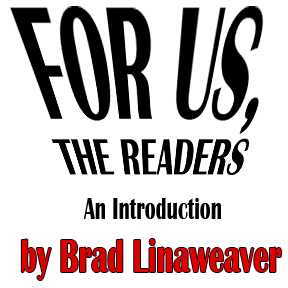
Welcome to Mondo Heinlein. Something like this had to happen eventually. With a subject this fecund, and a wealth of contributions, Mondo Cult opens the Doors of Perception to imagination unafraid. My only regret is that my friend, Bill Patterson, is not with us for the launch party. He finished his life's work of the Authorized Biography of Robert A. Heinlein in time for us; but not in time for him to reap the rewards of his splendid craft and dedication. Spider Robinson spoke for all of us when he expressed his sorrow over losing Bill, who died in April of 2014. Let me add, those of us who knew Mr. Patterson appreciated that he was a gentleman, in the original meaning of the word. An accounting of good deeds should include that I brought Bill Patterson together with Ginny Heinlein. She had not been satisfied with a number of potential biographers for Robert. The academic establishment and the science fiction establishment would never run out of inadequate candidates. The role I played is worthy of a science fiction story. By some miracle, I had become friends with Ginny. I wrote a review of the book she put together about Robert (Grumbles from the Grave) for The Atlanta Journal & Constitution in January, 1990. This was around the time I was contributing, as writer and an assistant editor, to Samuel Edward Konkin III's ever growing Heinlein Tribute Issue of New Libertarian (which finally appeared at the end of 1990). I was invited to Atlantic Beach, Florida, to meet Ginny and her cat, Snowy. The visit changed my life. 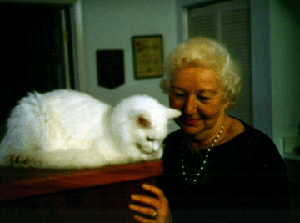
Ginny Heinlein and Snowy the Cat. This and other photos like it can be found at the Heinlein Archives in Santa Cruz, CA. Every year, like clockwork, I made a pilgrimage to Atlantic Beach. Most of the time, I was in the company of my best friend, Bill Ritch, and his heroic girlfriend, Caran Wilbanks. (She works for the CDC.) One memorable visit was in the company of J. Neil Schulman. Neil and I showed up at Virginia Heinlein's place the week of the Columbine Massacre. CNN was showing footage of a contraband bag that included Pocketbook novels that Dafydd ab Hugh and I had written, based on the DOOM video game from id Software. The books were property of the killers, who were fans of all things related to DOOM. Ginny was sympathetic. She said that I could understand what Robert went through over the claims that Charles Manson had been a fan of Stranger in a Strange Land. Indeed, I could. Imagine a lifetime of struggle to make a mark in the world, with sufficient cash customers (a favorite phrase of RAH) to pay the bills. All is going well, and then maniacs turn out to be part of your fan base. There is nothing to be done about it. That is the occasional price we pay for freedom of expression. On that day, I had an understanding of Robert A. Heinlein that no amount of revisionism and Monday morning quarterbacking will ever change. Three of the contributors to this Mondo Heinlein section are Bill Ritch, J. Neil Schulman and Dafydd ab Hugh. The late, great Robert Anton Wilson would make something of that; synchronicity, perhaps. Let us return to the main point. On those many visits to Atlantic Beach, I kept finding myself in a unique position to recommend the right biographer to Ginny. The stars must have been in alignment. A lot was happening. She agreed to let the Atlanta Radio Theatre Company adapt Heinlein stories, providing wonderful opportunities for Bill Ritch and myself. She endorsed the publication of a pulpless.com book edition of Schulman's noteworthy interview with Heinlein. Then, there was the greatest favor Ginny ever did for me by authorizing Tor Books to use Robert's endorsement when they released the 1993 paperback edition of my novel, Moon of Ice. Brad, Ginny and Bill Ritch during one of the storied pilgrimages to Atlantic Beach, FL. | PHOTO by Caran Wilbanks She was supportive of Patterson doing The Heinlein Journal, which august publication is discussed by Dafydd in his article. (There were many contributors over the years, including Ron Garmon.) I became an Associate Editor on the Journal. So did Patterson's friend, and brilliant academic, Dr. Robert James, who co-wrote the introductions with Patterson to the deluxe library books of The Virginia Edition of the complete works. With one exception. Bill Patterson invited me to co-write the introduction to Heinlein's seminal libertarian work, The Moon is a Harsh Mistress. That was appropriate because Ginny ended up leaving me the actual brass cannon, the icon of that novel (as discussed by Bill Ritch in his review of Volume 2 of the biography). I believe that co-editing Free Space for Tor books played a role in Ginny's bequest. That anthology was the most hardcore libertarian SF anthology to come out from a New York publisher. It was dedicated to Robert and Ginny, and those who named the Heinlein Crater in the Hellas Southeast Quadrangle of Mars. Yoji Kondo is forever appreciated. 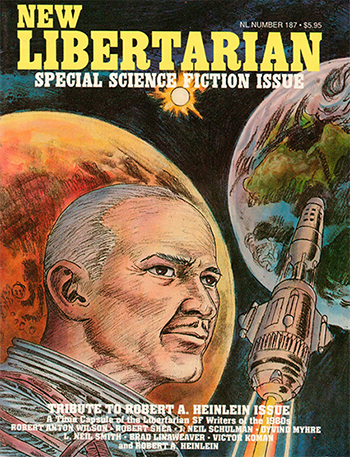
There's no mistaking what Ginny is holding in the photo above right. The fabled issue itself, in all its glory! From the Jessie Lilley Collection by the grace of Brad Linaweaver. There is much to remember. All these fine things, pulled back from the black hole of memory, and placed spinning, one after the other, must have a center of gravity. They orbit around the fact that Ginny decided that Patterson was the right man for the job when it came to the official BIOGRAPHY. It's almost as if Ginny had a platonic ideal of what the biographer should be. He would need to have the skills of an academic researcher, without carrying the burden of an academic agenda. That was William H. Patterson, Jr.! (Any doubts about Patterson's unique gifts for the task can be settled by reading The Martian Named Smith by Patterson and Andrew Thornton.) Ginny hoped for a biographer with sympathy for Robert A. Heinlein's libertarian individualism, but who would not, in an excess of doctrinal purity, distort the facts. No small thing. If the biographer was too ideological, it would spoil the quality of a literary biography. On the other hand, if the biographer failed to understand the Later Heinlein, that would disappoint Ginny, who worked harder than anyone to bring in the final harvest of Heinlein's visionary science fiction. Patterson seemed the man for the job. He was not only a radical libertarian, but a meticulous scholar convinced that Heinlein's greatest achievement existed outside of politics and economics. It was all about literature and philosophy. Patterson wanted Heinlein to be accepted as a major literary figure, defending the Enlightenment against the always present shadows of the Dark Ages. The first volume came out in 2010. The concluding volume came out in 2014. This was no casual enterprise. We at Mondo Cult, inspired by Patterson's example, have taken our own sweet time providing a banquet worthy of a gourmet feast. In keeping with Patterson's lifelong interest in good food, we offer the following on the menu. Cocktails are provided by John DeChancie, best-selling author of the Skyway Trilogy and the Castle Perilous series. One of our most popular Mondo contributors, and a prolific science fiction novelist, John can write actual poetry. He has outdone himself this time. The Appetizer is provided by Dafydd ab Hugh, with a highly personal tribute to Patterson as man, as fan, as pro. In the grand tradition of our contentious, but actually friendly, enterprise, my old pal believes there is a yawning abyss between theory and practice that doomed Patterson's cookery to fall short of a very high theory. In contrast, I was never disappointed by Patterson's cuisine. He seemed like a gourmet chef to me. So, we finally have a harmless controversy at Mondo Cult that, paradoxically, will give no one heartburn. We move to the Soup Course. Bill Ritch reviewed Volume 1 of the Authorized Biography in Mondo Cult 3, back in 2012. Here it appears again, in all its glory. The subtitle of the book, "Learning Curve | 1907-1948", takes on even greater significance after reading Volume 2. The Main Course is the long anticipated feast. Inspired by his subject, Bill Ritch uses Volume 2 as a springboard to go where Patterson has gone; and the two Bills grok the same things. Ritch has produced one hell of a long review/commentary, and I only wish it could be longer. One thing I'm sure that Patterson would have loved is the observation that Heinlein went from being Campbellian to Cabellian. It's a long road from Astounding to Jurgen. 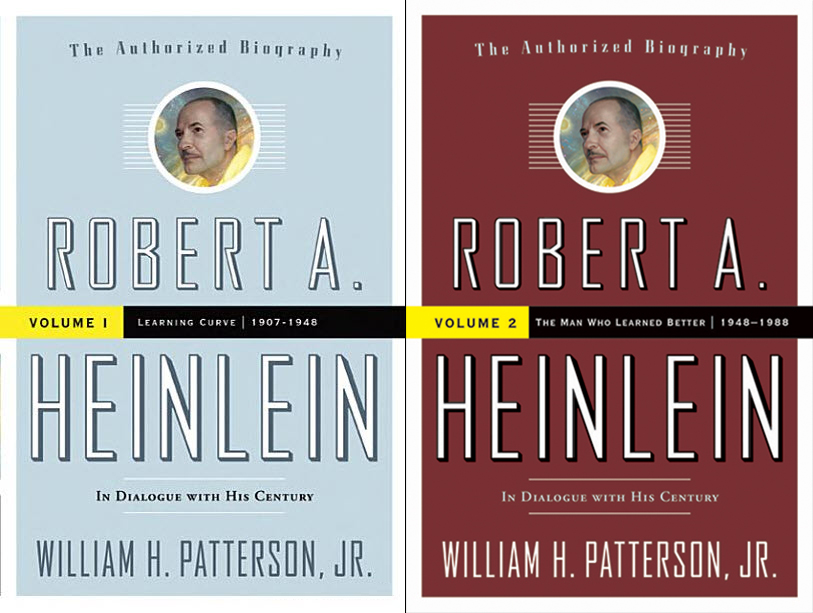 The subtitle this time is: "The Man Who Learned Better | 1948-1988". One review that understands the Patterson thesis is by Don Sakers in the December 2014 Analog. One review that misses the point is by Lee Sandlin in The Wall Street Journal, June 28-29, 2014. For anyone who got indigestion from Sandlin's undercooked stew of insincere compliments and heartfelt insults, the antidote is right here, courtesy of Ritch. Perhaps nothing sums up Sandlin better than his complaint that the two volume subtitle should have read: In Dialogue With His Editors. Common sense should be sufficient to assume a lot more is going on in a book with 671 pages. (We may have learned more than was intended in the manner of a confession. Sandlin is apparently bored by the idea of a writer in dialogue with his editors. We may finally have an explanation for the current quality of The Wall Street Journal.) Bill Ritch explores the various flavors of his favorite writer. Heinlein is many writers in one. When the table is cleared, it's time for Dessert. J. Neil Schulman (author of the novel, and filmmaker of Alongside Night) prepares us for a rich treat with which to end the meal. Neil's commentary takes me back to a past when I still believed in the future. Where were you on that special night in July of 1969? I was in Florida. My father and I were glued to the television set as Neil Armstrong set foot on the Moon. We'd been watching CBS. That means we saw another amazing thing before the most important event in history. Network broadcast news was what tied the world together back then. The news was put on the airwaves on free TV, for all the world to see. As a teenage science fiction fan, I wasn't expecting to see Walter Cronkite interviewing Arthur C. Clarke. There was no time to recover because the next thing you knew, Cronkite was talking to Robert A. Heinlein. My father and I were equally impressed. We had seen 2001: A Space Odyssey in a Cinerama Theatre the year before. We'd seen Destination Moon on TV several times. Clips from both films kept showing up on TV during this unforgettable week. But suddenly my Dad and I were little kids, going "Gosh Wow," as Robert and Arthur explained the Universe to Walter Cronkite. Neil will tell you a lot more about this Cosmic Moment, and take you to a magic place where you can see for yourself. You will also see how easy it is to order a copy of Neil's essential interview with RAH. (I would be remiss not to mention that Ray Bradbury also contributed to CBS being the truly historic network for in-depth Apollo coverage. Ray was in London. Mike Wallace interviewed him there. Then Cronkite broadcast the show for his American audience. Walter Cronkite was a science fiction fan.) 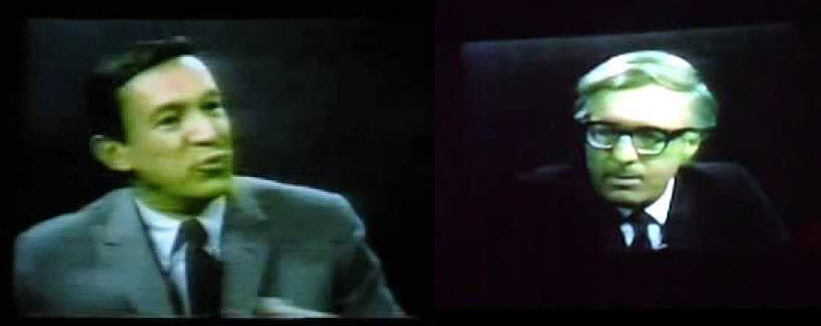 There is no better way to exit Mondo Heinlein. However, we have a few Side Dishes you can take home with you. Click on this Brass Cannon link, and you'll see that show, mentioned in the Bill Ritch review. Jessie does a screen grab of Patterson and me holding the cannon. The main event is the firing of the cannon at a California shooting range. Present are J. Neil Schulman, J. Kent Hastings, Randall N. Herrst and Yours Truly. Randy did the work of reconditioning the cannon so we could fire it. He did a great job. If you find the picture of Ray Bradbury, Harlan Ellison, Brinke Stevens and Anthony Daniels, there will be ordering information about the Dean's List Heinlein audio programs available from the Atlanta Radio Theater Company. But wait, there's more!!! Before I climb in my atomic rocket ship, and blast out of here, I wish to end this with a bit of controversy. Old habits die hard. And then I want to extend a special thanks to an unsung hero. Here's the controversy. The first week Patterson spent in the Heinlein archives in Santa Cruz, California, I was invited along. Ginny gave me permission to do research for an article I was doing on the 50th anniversary of Destination Moon. I was granted access to all sorts of material that had not been seen before. My article, "Destination Freedom," appeared in Cult Movies #33, and was read all over the country in 2000. A longer version appeared in The Heinlein Journal, July 2001, and was read by a considerably smaller audience. I found a smoking gun (or smoking rocket) of what Heinlein liked to call Red Fascism. If he hadn't been on top of things, Communist propaganda would have been inserted into this influential film. Naturally, I've waited all these years for that information to reach the film studies. Fortunately, I didn't hold my breath. Apparently it's so shocking that a Guild member might be a Party hack, in the late forties, that writers on film refuse to believe it. Maybe it's as unbelievable as a writer's work being rewritten on a whim by just anyone in, of all places, Hollywood. There is a serious point buried in all this. Shouldn't writers on film be under less pressure (at any period in history) than the working stiffs actually trying to write the scripts and get paid? Where is the pressure coming on the writers who just write about old films? 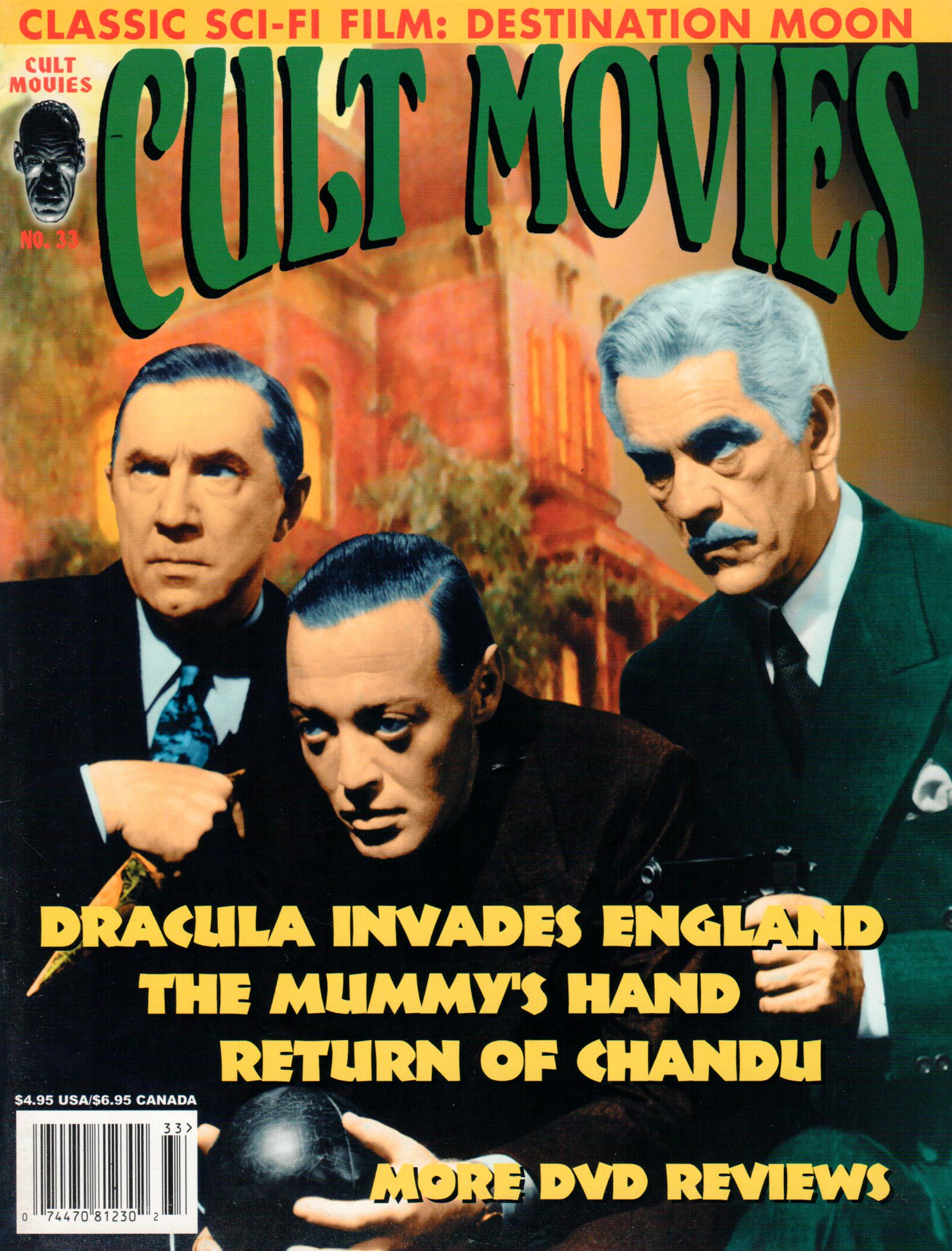
Cult Movies #33 Robert A. Heinlein was a premature anti-Communist in Hollywood. That must be the problem. We should be past all that by now. But we're not. To prove that I'm not crazy on this topic, I watched every minute of the incredibly long Moguls & Movie Stars: A History of Hollywood, broadcast on TCM in 2010 and packaged as a DVD set in 2011. Imagine my surprise that the Hollywood Ten showed up in the show, without the admission that any of them were ever members of the Communist Party. TCM doesn't stand for Turner Communist Movies, so it must be an oversight. Yeah, that must be it. There are some truthful histories about this period in Hollywood. Indispensable researchers admit to the Communist players, but also note how clumsy and foolish the reactions could be when everything came to light. My point is that these books are not put out by our usual genre film publishers. A recent chapter that gets everything right is in Dark History of Hollywood (Amber Books). The author has the advantage of not being an American. Kieron Connolly is a graduate of Edinburgh University. He lives in London. His book came out last year. It is so mainstream that you can find it in a normal bookstore. Heinlein went from being an Upton Sinclair Socialist to being a Goldwater Republican. He was always an individualist. He became one of the most influential libertarians in America. He always hated Nazism. He always hated Communism. There is little doubt that the author of, "If this Goes On" would despise the Nehemiah Scudders who have taken over so much of today's Republican Party. What's the big deal? 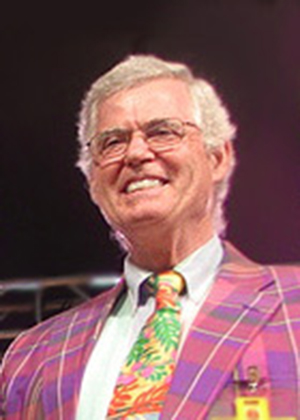
David G. Hartwell (1941-2016) Dig the threads. It's possible that the controversies swirling around Starship Troopers and Farnham's Freehold may be less of a problem for Heinlein's critical acceptance then his consistent opposition to Marx. To quote Lenin: What is to be done? One answer is to read Volume 2 of the Authorized Biography. Patterson uses the same archival material I did in my article. Hopefully, enough readers will come across what happened behind the scenes on Destination Moon for the facts to finally show up in writings on science fiction movies. Well, enough of that. It's compliment time. The unsung hero of this epic is David Hartwell. I've had a long association with him. He was the editor who helped me expand a novella into the novel of Moon of Ice. He had other encounters with libertarian science fiction, but probably nothing prepared him for dealing with Ed Kramer and me on Free Space. That's a long story. Chaos ensued, but the book actually came out. So, after weathering those storms, Hartwell took on the tranquil editorial assignment of working on the definitive biography of one of the most controversial writers of the 20th Century. The amount of libertarian content in the second volume of the Heinlein biography is nothing short of remarkable. Of course, we thank the Herculean labors of William H. Patterson, Jr.! But I want to take this opportunity to salute David G. Hartwell. | ||||||||||||||||















